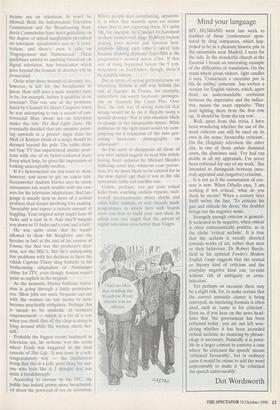Mind your language
MY HUSBAND went last week to another of those 'conferences' spon- sored by drug companies, which hap- pened to be in a pleasant historic pile in the mountains near Madrid. I went for the ride. In the wonderful church at the Escorial I found an interesting example of the difficulties of translation. On the stand where pious visitors light candles it says, `Comiencen a encender por la fila de arriba;' someone has written a version for English visitors, which, apart from an understandable confusion between the imperative and the indica- tive, means the exact opposite: 'They start lighting them from the first row up.' It should be 'from the top row'.
Well, apart from this trivia, I have been wondering whether the use of the word criticism can still be used on its own in the sense 'favourable criticism'. On the (English) television the other day, in one of those unfair dismissal cases, the dismissee said, 'I've had top marks in all my appraisals. I've never been criticised for any of my work.' She intended to distinguish between (neu- tral) appraisal and (negative) criticism.
It is not as if the connotation of cen- sure is new. When Othello says, 'I am nothing if not critical,' what do you think he means? When a century later Swift writes the line, 'To criticise his gait and ridicule his dress,' the doublet brings out the negative sense.
Strangely enough criticism is general- ly reckoned to be negative, when critical is often enthusiastically positive, as in the cliché 'critical acclaim'. It is true that the acclaim is usually directed towards works of art, rather than men or their behaviour. Dr Robert Burch- field in his updated Fowler's Modern English Usage suggests that the textual or literary kind of criticism and the everyday negative kind can 'co-exist without risk of ambiguity or cross- infection'.
Yet perhaps on occasion there may be a slight risk, for, to make certain that the correct semantic cluster is being conveyed, an insulating formula is often used, such as 'came in for criticism'. Even so, if you hear on the news head- lines that 'the government has been criticised today', you are not left won- dering whether it has been accorded critical acclaim; no nuancing by phrase- ology is necessary. Naturally it is possi- ble in a larger context to contrive a case where 'he criticised the speech' means 'criticised favourably', but in ordinary cases it would be otiose to add the word unfavourably to make it 'he criticised the speech unfavourably'.
Dot Wordsworth










































































 Previous page
Previous page